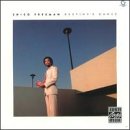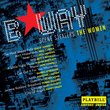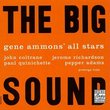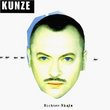| All Artists: Chico Freeman Title: Destiny's Dance Members Wishing: 1 Total Copies: 0 Label: Ojc Release Date: 1/15/1994 Genres: Jazz, Pop Styles: Modern Postbebop, Bebop Number of Discs: 1 SwapaCD Credits: 1 UPCs: 025218679923, 0090204111367, 025218400817 |
Search - Chico Freeman :: Destiny's Dance
 | Chico Freeman Destiny's Dance Genres: Jazz, Pop
|
Larger Image |
CD DetailsSimilar CDs |
CD ReviewsA very special session Jan P. Dennis | Monument, CO USA | 02/05/2004 (5 out of 5 stars) "When thinking about father/son jazzmen, who first comes to mind? John Coltrane/Ravi Coltrane? Dewey Redman/Joshua Redman? Thelonius Monk/T.S. Monk? Freddie Waits/Nasheet Waits? Jackie Mclean/Renee Mclean? Ornette Coleman/Denardo Coleman? Terry Gibbs/Gerry Gibbs? Jerry Granelli/J.A. Granelli? Probably not Von Freeman/Chico Freeman, unless you're really into the Chicago scene. Chico may be the only one of the above more famous AND a better player than his dad (Joshua's probably more famous, but not as good as Dewey; Nasheet's probably better, but less famous than Freddie--although neither, it must be said, is a household name).As a young man in the late seventies and early eighties, Chico made a series of very fine albums including Chico, Morning Song, Beyond the Rain, Spirit Sensitive, The Outside Within, and Destiny's Dance, mostly on small independent labels like India Navigation and Contemporary (a division of Fantasy out of San Francisco). Of these, Destiny's Dance seems to me to be the most accomplished; he's honed his "outside in" approach to maximum impact, has perhaps his best band, and there just seems to be some kind of magic in the air--although it must be said that any of these are worth hearing. This was the Heyday of Contemporary. They had a fine stable of young players and seasoned veterans: Bobby Hutcherson, George Cables, Art Farmer, Barney Kessel, Frank Morgan, Benny Golson, Tom Harrell.On to the music. From the first few notes of the extremely tricky--melodically and rhythmically--unison tenor/trumpet passage that opens the first song on Destiny's Dance, you can tell something special's afoot. When the tempo rockets forward as the whole band roars in, featuring even more daring unison tenor/trumpet playing, followed by some impossibly tasty solo licks from a very young Wynton Marsalis, a gripping short solo from Freeman, and Bobby Hutcherson all over his vibes like a tarp covering the infield, you're in some kind of zone only the greats can access.More unison lines, this time with Wynton on muted trumpet and Freeman on bass clarinet, presenting a radically different soundscape, open "Crossing the Sudan," underpinned by McBee's mesmeric bass figures, lending the piece a hugely exotic feel--you're there, bobbing up and down as your camel keeps pace with the others in the caravan.In between we get another one of those beatiful, mystery-laden Arabic-tinged compositions from Bobby Hutcherson, "Same Shame," marvelously, effortlessly rendered by the quartet (Marsalis and Dennis Moorman on piano sitting out)."Wilpan's Walk," an attractive burner from Cecil McBee follows, featuring the full septet, Paulino Da Costa on scintillating percussions joining Freeman, Marsalis, McBee, Moorman, Hutcherson, and the great Ronnie Burrage on drums. A high-wire act from beginning to end, this tune displays a level of small-group interaction that simply astounds.More interesting unison sonorities--bass clarinet/arco bass--open "Embracing Oneness," a very hip slow number that shifts between freeish and bop-tinged bloozy passages. Quite beguiling.The disc closes with what begins as another all-out burner, "C & M," again featuring some jaw-dropping unison playing. But then it shifts to a slow passage, revs up again, slows down, cruises for a while, and finally blasts into the stratisphere with a mind-boggling outro, an entirely apt close for these supercharged proceedings.My only complaint is that at 36:34 it's a little on the short side. But that's no biggie. The overall brilliance of this session more than makes up for its brevity. And anyway, there's something to be said for gettin' in, gettin' it done, and gettin' out.All in all, a stunning performance." Don't Miss This ! nadav haber | jerusalem Israel | 04/24/2002 (5 out of 5 stars) "I used to be biased against post 60's jazz. I thought that after Coltrane, Dolphy, Ayler, and Miles Smiles - everything became less interesting. I was wrong, of course. There are post 60's works by Sun Ra, Cecil Taylor, Ornette Coleman, Sam Rivers, post 60's giants such as David Murray, Anthony Braxton, The Art Ensemble, Arthur Blythe, David S. Ware,Charles Gayle, and many others. One CD that helped me realize my mistake was this one by Chico Freeman. It is not as experimental as some of the others I mentioned, but it is original, creative, and superbly performed. Chico Freeman plays both saxophone and bass clarinet with equal beauty. The tunes are all interesting, while I especially liked "Crossing the Sudan" and "Embracing Oneness" - these are the slower tracks. Note Bobby Hutcherson wonderful vibes - he never ceases to sound good ! This is a CD for all who like their jazz creative, innovative and well played." Like being at a magic show: How do they do that? Eric C. Sedensky | Madison, AL, US | 06/28/2008 (4 out of 5 stars) "Over the course of about one year, I have purchased somewhere between 65 and 75 jazz CD's, all of them being "traditional" jazz, and not the smooth jazz one hears so often on the radio these days. Among those 65-or-so CD's, there have been many I liked, a few I didn't, one or two I hated, and a couple that I just can't figure out. When I say "just can't figure out", I mean it in a good way, and I can explain what I mean while writing a review of Chico Freeman's Destiny's Dance at the same time. Let's take rhythm first. I think we can agree that jazz is nothing if not rhythmic. Jazz is rooted in rhythm. So, while it is okay to explore different rhythms, it is not okay (necessarily) just to explore for the sake of exploring - eventually, you have to "find" some rhythm. Chico's CD does just that. You don't really feel like you can tap your toes to the songs, but you do. When he diverges off of one rhythmic path, he manages to find another to take him back to where he wants the song to go. The effect is disorienting but not unsatisfying, and it's a mystery to me how he does it. Then, there is melody and harmony. I've always said jazz only qualifies as music if you can hum the song or write it down on a score. Chico's melodies and harmonies don't stand out. When I'm not listening to the CD, I'm hard pressed to hum even one bar, but when I am listening to it, I can hum right along and even remember the dynamics of the individual instruments. How my brain can completely forget a melody it just heard and yet recall it readily when listening again is, like I said, a mystery. Finally, there is the chemistry. It's been said Miles Davis wasn't the greatest jazz trumpeter of all time, but he could assemble a band better than anyone. Chico seems to have taken a page out of Miles' book. Bobby Hutcherson on vibes is nothing short of a musical coup d'etat here, and he is used to great effect throughout the CD. Then you've got Wynton Marsalis on trumpet. I've never been a big fan of Wynton, but on this CD, he lights up every song he plays on (four of the seven tracks). I'm guessing that band chemistry is what makes the magic and mystery of this CD happen. So, I don't know how Chico does it, because I can't figure out this CD, but I like it a lot and I will continue to listen to it often, because I like to solve a mystery as much as the next guy, and I enjoy good jazz music, which this is, undeniably. I recommend this CD to all jazz fans and anybody who likes magic shows.
" |

 Track Listings (6) - Disc #1
Track Listings (6) - Disc #1

